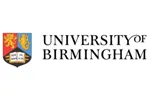We're moving! This site will be relocating to goingto.university in 2026. Please update your bookmarks to the new address.


the United Kingdom
University of Birmingham| The award | How you will study | Study duration | Course start | Domestic course fees | International course fees |
|---|---|---|---|---|---|
| MA | Part-time | 2 years | September | GBP 2090 per year | - |
| MA | Full-time | 1 year | September | GBP 4180 per year | GBP 15210 per year |
The MA by Research programme requires you to prepare a dissertation of up to 40,000 words on a topic of your choice, for which an academic staff member will provide expert supervision.
Our principal areas of research include:
Cognitive Linguistics - an increasingly important area of departmental activity, research here focusses on the putative mental dispositions underlying language users' processing of space, time, metaphor and other forms of figurative language. Research is underpinned by experimental methods involving eye-tracking equipment and, increasingly, similar techniques. A new focus of work, linking corpus and cognitive research, concerns the importance of usage, patterns and constructions, in language acquisition and fluency.
Corpus Linguistics - our work in this area incorporates interests in linguistic theory and language description, including descriptive translation and contrastive studies, phraseology and the lexis-grammar interface, and in the application of corpus investigation techniques to areas such as translation, lexicography and diachronic language study. Corpus techniques also underpin much of our work in discourse studies and in language learning and teaching.
Stylistics and Discourse Studies - our work here focuses on written narrative structure and texture, text linguistics (diachronic as well as synchronic), literary stylistics, and critical discourse analysis. Major themes of interest include academic discourse, the relationship between language and social class, evaluation, language and new media, everyday creativity, and multi-modal discourse.
Language Learning and Teaching - our work in this area incorporates corpus approaches to phraseology, lexis and grammar, and discourse approaches to academic literacies. This also includes a focus on the teaching and learning of figurative language, collocation, and business English in the context of English as a global language. We also focus on cognitive linguistics and its applications to language learning and teaching.
Below are some suggested courses at other providers that you may also be interested in:
If you do not meet the entry requirements for this course then consider one of these postgraduate preparation courses from another institution:
Graduate Diploma of Engineering (Industrial Automation)
Engineering Institute of Technology
Find out moreThere are 944 other courses listed from University of Birmingham. A selection of these are displayed below:
Accounting and Finance with Language (French or German) N4R1/N4R2 BSc
University of Birmingham
Find out moreAdvanced Chemical Engineering (with options in Food Processing, Pharmaceutical Technology and Business Studies) MSc, Postgraduate Diploma
University of Birmingham
Find out moreJoin the StudyLink email list and never miss a chance to turn your study abroad dreams into reality!
